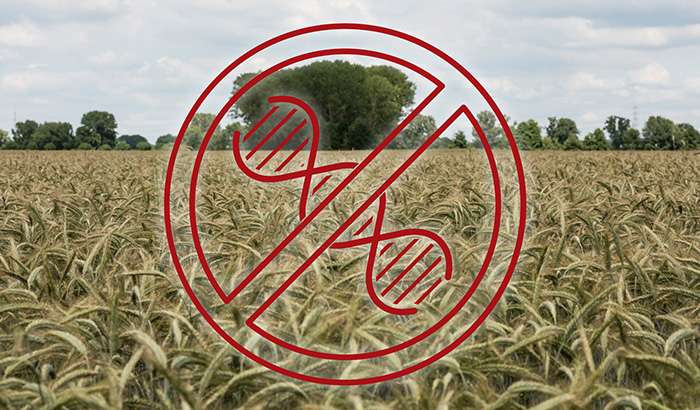German associations call for strict regulation of new genetic engineering

News
Open letter to the German Minister of Agriculture Özdemir
Open letter to the German Minister of Agriculture Özdemir: There must be no deregulation of new genetic engineering methods. Instead, the right to GMO-free food production, freedom of choice and the precautionary principle must be safeguarded. These are the central demands of a joint position paper by 139 German associations, including Naturland, which was published in Berlin recently.
The paper identifies the consequences of uncontrolled deregulation and criticizes the planned abolition of the existing principles of genetic engineering law. The signatory German associations and alliances come from the agricultural and food industry, environmental and consumer protection, development cooperation and various youth movements.
The publication of the paper was accompanied by an open letter to the German Minister of Agriculture Cem Özdemir. In it, the Bund für Umwelt und Naturschutz Deutschland (BUND), the Arbeitsgemeinschaft bäuerliche Landwirtschaft (AbL) and the Bund Ökologische Lebensmittelwirtschaft (BÖLW), together with the youth organizations BUNDjugend and junge AbL (jABL), call for the preservation of freedom of choice, the safeguarding of GMO-free conventional and organic food production, transparency and the protection of natural resources and the continued strict regulation of new genetic engineering techniques.
BÖLW board member Tina Andres comments: "The organic food industry works without genetic engineering, transparently and sustainably - in line with the wishes of over 90 percent of consumers. The genetic engineering industry now wants to impose its economic model on us - a federal government with a target of 30 percent organic must not allow this!"
The complete BÖLW press release on the open letter can be found here.
The press release and the position paper were published in German. Read our translation of the joint position paper below. No guarantee can be given for the correctness of the translation.
--
JOINT POSITION PAPER. NO DEREGULATION OF NEW GENETIC ENGINEERING METHODS!
Safeguard the right to GMO-free production, freedom of choice and the precautionary principle!
139 associations and civil society organizations are calling on the German government and the European Parliament to reject the EU Commission's proposal on the Deregulation of new genetic engineering methods should be rejected. Genetic engineering must continue to be regulated consistently in accordance with the EU Genetic Engineering Act and in line with the precautionary principle.
In July 2023, the EU Commission presented a legislative proposal to completely deregulate the cultivation and marketing of almost all products derived from new genetic engineering techniques (hereinafter: NGT)1, which is currently being discussed in EU committees. The legislative proposal adopts all the demands of the genetic engineering lobby - while the interests of consumers, the environment and GMO-free food production are not taken into account. The implementation of this proposal would abolish central standards, such as the mandatory approval procedure with a risk assessment and verification procedure, clear labeling, coexistence and the polluter pays principle.
In the view of the undersigned associations, the proposed legislation should be rejected as it prevents GMO-free conventional and organic food production and thus deprives EU citizens of the freedom to decide against genetic engineering. The proposed legislation disregards the precautionary principle, violates the right to food enshrined in international law and international environmental agreements such as the Cartagena Protocol.2
The majority of NGT plants currently being developed would enter into food production and the environment untested, unlabeled and unchecked. Liability and traceability would be abolished. The proposed legislation would result in a new wave of patenting. Future breeding and genetic and biological diversity would be jeopardized. There would be an even greater concentration of the seed market among a few corporations.
We call on the German government and the EU Parliament: Reject this legislative proposal!
In 2018 and 2023, the Court of Justice of the European Union (CJEU) confirmed that the existing genetic engineering law offers sufficient flexibility to continue to regulate NDT processes appropriately and in compliance with the precautionary principle and freedom of choice enshrined in EU treaties.3 As NGT plants can pose risks to the environment as well as the health of humans and animals, a comprehensive risk assessment of all NGTs is imperative.
A softening of genetic engineering legislation would have massive negative consequences
The legislative proposal currently being negotiated means abolishing the current central rules for NGTs. This would be at the expense of farmers, seed producers, breeders and all other actors along the food chain and would affect all consumers:
- The vast majority of genetically modified plants (up to 94%4) would no longer be regulated at all: They would be released onto the fields and markets without an approval procedure and without risk assessment. This would effectively abolish the precautionary principle, not least because genetically modified organisms (GMOs) have no chance of being retrieved once they have been released into the environment.
- Food and feed produced from NGT plants would reach processing and supermarket shelves without labeling and without mandatory verification procedures. Without labeling and traceability, there is no longer any freedom of choice for consumers and producers along the entire food production chain. As with existing genetically modified plants, it can also be assumed that NGT plants would largely be used to feed animals. It would also be irresponsible from an animal welfare perspective if these plants were not thoroughly tested for risks.
- GMO-free plant breeding, seed production, agriculture, beekeeping and food processing would no longer be possible in the medium term. Currently, the new EU regulation does not provide for any specific precautionary obligations to protect GMO-free conventional and organic production. Contamination through cross-breeding or mixing could therefore no longer be prevented. The previously mandatory site register, which provides all stakeholders with transparency regarding genetically engineered areas, would also be abolished.
- There is too little research on risks to the environment, ecosystems as well as the health of humans and animals - and many unanswered questions. The abolition of mandatory risk assessment would therefore be a clear violation of the precautionary principle. A comprehensive risk assessment for every GMO, especially for releases into the environment, is absolutely essential.
- The genetic engineering industry would no longer have to submit verification procedures for the NGT products. GMO-free plant breeding, seed production, agriculture and food processing would lack one of the most important instruments for effective protection against contamination. Liability rules could then no longer be implemented and those responsible for damage and contamination could no longer be prosecuted. This means that the polluter pays principle cannot be implemented. While the genetic engineering industry would be given carte blanche, GMO-free food production would be left to pay for the damage. The great competitive advantage of GMO-free food production would thus be sacrificed.
- Even herbicide-tolerant NGT plants, which have been proven to increase the use of pesticides and reduce biodiversity, would enter the market and our environment unchecked.5 The proposed legislation would even encourage the use of such plants.
- The planned deregulation would trigger a new wave of patenting, as the use of genetic engineering is always associated with patents on seeds, plants and food. Large seed companies could thus expand their market power even further. As a result, access to genetic material for small and medium-sized plant breeders would be massively restricted, although it is precisely their innovation potential that is particularly needed for the further development of crop diversity.
Genetic and biological diversity, which is urgently needed to solve the biodiversity and climate crises, would be jeopardized and breeders and farmers would be drawn into new, dangerous dependencies. Paths towards sustainable and climate-resilient agriculture would thus be thwarted or completely blocked in the long term. We can expect higher food prices for consumers, considerable restrictions on the diversity of varieties and higher seed prices. Small and medium-sized farms here and in the Global South in particular would be massively affected by this, as their diversity secures the majority of humanity's food supply.
Our position is clear: genetic engineering is genetic engineering. All genetic engineering methods must continue to be strictly regulated. This is the only way to protect the environment, consumers and the GMO-free agriculture and food industry.
We demand:
- The legislative proposal currently being negotiated in Brussels must be rejected. The new genetic engineering techniques must continue to be comprehensively regulated in accordance with the European precautionary principle and environmental and consumer protection.
- All NGT plants must continue to be comprehensively tested for risks in approval procedures (individual case testing), which also includes technology-related risks, including unintended effects.
- Freedom of choice and transparency for consumers, farmers, beekeepers, breeders, seed producers, food processing companies and food retailers must be preserved.
- The labeling obligation along the entire value chain must be maintained. This is the only way to ensure traceability. In addition, EU-wide uniform and strict coexistence rules must be enacted to rule out contamination. Location registers and no-fault and joint and several liability regulations are mandatory in order to enforce the polluter pays principle.
- Verification procedures must remain a prerequisite for an approval procedure, both for applications for the cultivation and import of GMOs. Companies must be legally obliged to develop and provide detection methods for their NGT products.
- A global, publicly accessible register must be set up in which comprehensive information on all released, cultivated or marketed GMOs (including their modified DNA sequence).
- Patents on living beings must no longer be granted. Corporations must not be allowed to appropriate the millennia-long breeding work of farmers and regional breeders. As long as the issue of patenting has not been resolved, negotiations on the draft law must be frozen.
- Due to the consequential damage to biodiversity, herbicide-tolerant and insecticide-producing plants must be banned.
- A ban on genetic engineering for animal breeding. If the proposed legislation were implemented, it would open the door to more applications of NGT in animal breeding. We need animal-friendly husbandry and appropriate breeding - instead of mass animal experiments designed to adapt animals to pathogenic maximum performance targets with the help of new genetic engineering methods. In risk assessment, feeding trials should be replaced by suitable methods as soon as possible.
- The retrievability of GMOs from the environment must be ensured due to potential ecological risks. The release of GMOs into the environment is a decision that has an impact for generations. This requires long-term monitoring and surveillance of the complex interactions between plants with new properties and the environment.
Instead of abolishing existing genetic engineering regulations, the research and development of agro-ecological systems and cultivation methods, as well as their regional adaptation and implementation, is necessary to counteract the climate crisis and loss of biodiversity and must be promoted more strongly. This also applies to organic and conventional GMO-free breeding.
Glossary
GMO: Genetically modified organism
NGT: New genetic engineering methods
ECJ: Court of Justice of the European Union
Precautionary principle: The precautionary principle is a principle of environmental and health policy. It serves to prevent risks and hazards and is laid down in Article 191 of the Treaty on the Functioning of the European Union (TFEU). Possible burdens or damage to the environment or human health that may result from the introduction of technologies should be avoided in advance or reduced as far as possible. Measures must therefore be taken to protect the environment and human health.
Freedom of choice: Freedom of choice is not only a right to claim, but also a right of defense. In this case, the right of defense means that no one may be forced to consume genetically modified products. The state therefore has a duty to protect consumers from this coercion. It can only do this by ensuring that they have access to non-genetically modified products, even if genetically modified products are available on the market.
Right to food enshrined in international law: "Furthermore, the UN Committee on Economic, Social and Cultural Rights states that this food must be acceptable within a particular culture or to the consumer. This means that "as far as possible, values associated with food and food intake that have nothing to do with nutrition and the concerns of informed consumers about the type of food to which they have access, must also be taken into account." (United Nations Economic and Social Council, Committee on Economic, Social and Cultural Rights: Matters related to the implementation of the International Covenant on Economic, Social and Cultural Rights: General Comment 12 of May 12, 1999, (E/C.12/1999/5, p. 11)
139 associations and organizations from civil society against the deregulation of new genetic engineering techniques
The position paper is supported by associations and organizations from the fields of environmental, animal and nature conservation, development policy, churches, consumer protection, social justice, conventional and organic agriculture, breeding, seed production, conservation of livestock and crop diversity, food trade, food processing, food crafts and beekeeping as well as youth movements, initiatives from the climate protection movement and from the movements for socially and ecologically responsible food systems.
2 Precautionary principle: Basis of European environmental and consumer protection law (for a more detailed definition, see glossary); UN Guidelines on Consumer Protection: https://www.fairtrading.nsw.gov.au/help-centre/youth-andseniors/youth/international-consumer-rights; GGSC on the Cartagena Protocol: https://www.gruenebundestag.de/fileadmin/media/gruenebundestag_de/themen_az/gentechnik/pdf/Gruene_im_Bundestag_Gutachten Vereinbarkeit_des_Kommissionsvorschlags_zu_NGT_mit_dem_Vorsorgeprinzip.pdf; right to food enshrined in international law (see glossary)
3 https://curia.europa.eu/jcms/upload/docs/application/pdf/2018-07/cp180111de.pdf, https://curia.europa.eu/jcms/upload/docs/application/pdf/2023-02/cp230022de.pdf
5 Schütte, G., Eckerstorfer, M., Rastelli, V., Reichenbecher, W., Restrepo-Vassalli, S., Ruohonen-Lehto, M., Wuest Saucy, A.G., Mertens, M. (2017) Herbicide resistance and biodiversity: agronomic and environmental aspects of genetically modified herbicide-resistant plants. Environ Sci Eur 29:5, doi: 10.1186/s12302-016-0100-y







